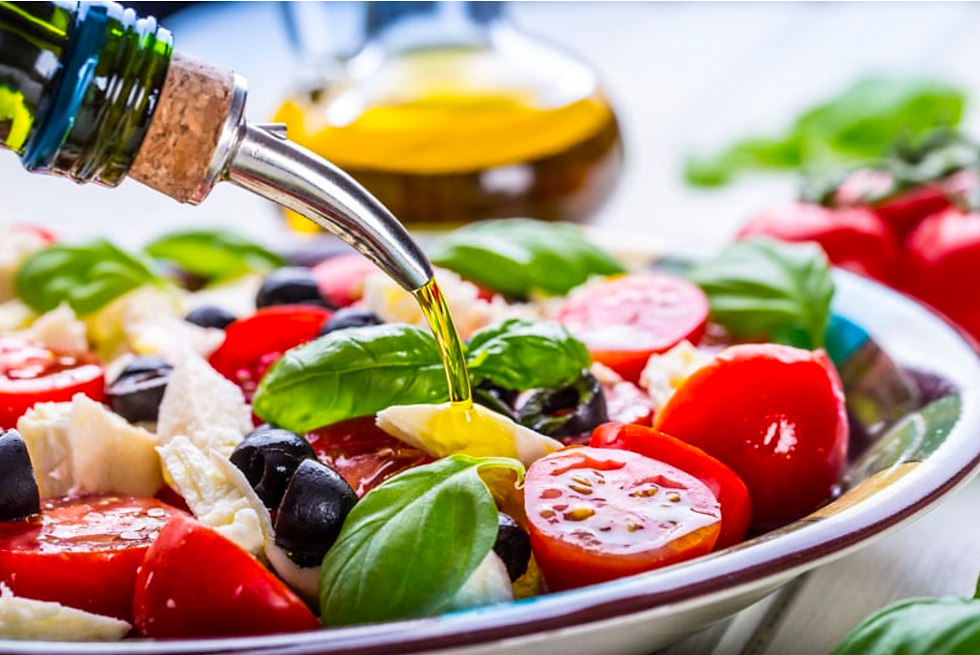Greece: the First “Fusion Cuisine” in History
- Jacqueline Rogers
- Feb 4, 2024
- 4 min read

Greek Salad, with ingredients encompassing “fusion cuisine”
The culinary tradition of Greece dates back to over 4000 years ago to the time of the Ancient Greeks (1). The diet of the Ancient Greeks focused on wheat, olive oil and wine, with additions of fresh fruits (especially grapes) and vegetables, legumes, and fish (1). Greece is considered to be the very first example of “fusion cuisine”, as interactions from other various civilizations over time led to the incorporation of new foods and culinary traditions (1,2). In the 5th century BC, when the Persians invaded Greece, foods such as yoghurt, rice, honey and sesame seeds were introduced to the Ancient Greeks (2,3). These have become staples in traditional Greek dishes. Yoghurt, for example, is used along with cucumbers to create a traditional sauce known as Tzatziki, while honey is used to make sweets and for its medicinal properties (1,2). Following this, around mid 4th century BC, a Greek poet named Archestratus wrote a poem entitled ‘‘Hedypatheia‘ meaning “Life of Luxury”(4). In this poem, Archestratus explains where to find the best food in Greece and the Mediterranean area as well as “golden rules” about cooking and eating (4). It is because of this work that Archestratus is known as the first Gourmand (4). It is even argued that ‘Hedypatheia’ is the first cookbook ever created (4).
For more information on Archestratus, the first Gourmand, check out the link below!
Another example of “fusion cuisine” occurred with the expansion of the ancient Greek Empire to India under the rule of Alexander the Great from 336–323 B.C (3,5). This expansion brought eastern and northern cuisine influences to the table (3,5). Citron, a fruit similar to lemons, was one of the many flora species sent back to ancient Greece from Asia during this time (3,5). The Romans invasion of Greece in 197 B.C. brought pasta and Italian-style sauces (2,5). When considering herbs, the Ancient Greeks largely used dried oregano and basil to season dishes, but began to incorporate spices such as cumin, cinnamon, cloves and allspice due to the influence of Arab traders in the southern part of Greece (2,5). Notably, “hummus”, which is the Arab word for chickpeas, was also introduced to Greek cuisine through trade (5). In 330 A.D. the Byzantine Empire arose (5). During the period of its reign for 1,123 years, cheeses such as anthotyro and kefalotyri, an omelet dish commonly known as sphoungata, and modern day Greek pies were introduced (2,5). Scholars also believe that it was during this time that the tradition of eating lamb on Easter Sunday arose, as rich Byzantines would occasionally consume the dish (5). Following the Turk invasion of the Byzantine Empire and thus the rise of the Ottoman Empire in 1453, classic dishes such as saganaki pots, halva, loukoumia and baklava were all introduced (2,5). While these are now largely considered to be traditional Greek dishes, the names are of Turkish origin, as dishes were required to be called by Turkish names during this period (2,5). The final notable “fusion cuisine” aspects were brought to Greece from the New World following the start of the Americas exploration about 500 years ago (5). Among the most notable foods brought over that have been largely incorporated into Geek cuisine were tomatoes and potatoes (2,5).
Greek Cuisine and the Mediterranean Diet
Even throughout the centuries, with multiple cultural and dietary influences, Greek cuisine has remained in line with the Mediterranean diet (1,6,7). The Mediterranean diet originated from civilizations that existed around the Mediterranean Basin, and is largely considered today as a lifestyle, rather than a diet alone (6,7). Given that this diet encompasses multiple cultures, there is not one specific definition of the Mediterranean diet (6,7). Rather, the diet emphasizes the consumption of fruits, vegetables, legumes, seed/nuts, fish (about 2x per week) and olive oil (6,7). It stresses moderate consumption of dairy and poultry and minimal consumption of red meat (6,7). Overall, research has supported that the Mediterranean diet, and thus traditional Greek cuisine, is beneficial for overall health (7). Specifically, research supports that adherence to this lifestyle is beneficial to healthy weight maintenance, heart health, prevention against neurological diseases and stroke, prevention against cancer, and diabetes prevention/maintenance (7). This is important information to consider when working with a client from Greek culture (6). Although adherence to Mediterranean style diet (and therefore Greek cuisine) has been proven to be beneficial to health, there is concern for increased Westernized diet implementation (6). Specifically, concern lies in the increase of fast food and take-out consumption, the eating of bigger meals later in the day due to longer work hours, and the increased amount of processed foods. Therefore, working with a client with a Greek culture background would likely involve promoting going back to traditional Greek foods and the Mediterranean diet lifestyle (as outlined above) over the growing Westernized version of Greek cuisine. Specifically, working with the client to increase fruit and vegetable servings, to choose healthy fats such as fish and olive oil over saturated fats, and to choose leaner protein sources or plant-based protein sources over red meats.
Spanakopita Recipe (Greek Spinach Pie) (in traditional form)(8)
Influence from the Byzantines (see above)
For the Spinach and Feta Filling
16 oz chopped spinach
2 bunches parsley, finely chopped
1 large yellow onion, finely chopped
2 garlic cloves, minced
2 tbsp extra virgin olive oil
4 eggs
10.5 oz feta cheese
2 tsp dried dill weed
black pepper
For the Crust
1 16 oz package fillo dough
1 cup extra virgin olive oil
FOODINANCIENTGREECE.FactsandDetails.AccessedMarch19,2023. https://factsanddetails.com/world/cat56/sub406/item2021.html
EssidMY.Chapter2.HistoryofMediterraneanfood.In:MediTERRA.;:51-69.
MonzaniG.ConquestsofAlexandertheGreatLeftTracesinModernCuisine.GreekReporter.PublishedMay7,
TsolakidouS.Archestratus:TheAncientGreekGourmandontheSecretsofGastronomy.GreekReporter.
Theevolutionofworldcuisines.Britannica.AccessedMarch18,2023.
ParavantesE.GREECEINFORMATIONSHEET.AccessedMarch19,2023.
LăcătușuCM,GrigorescuED,FloriaM,OnofriescuA,MihaiBM.TheMediterraneanDiet:Froman
KaradshehS.SpanakopitaRecipe(GreekSpinachPie).TheMediterraneanDish.PublishedJuly16,2019.



Comments